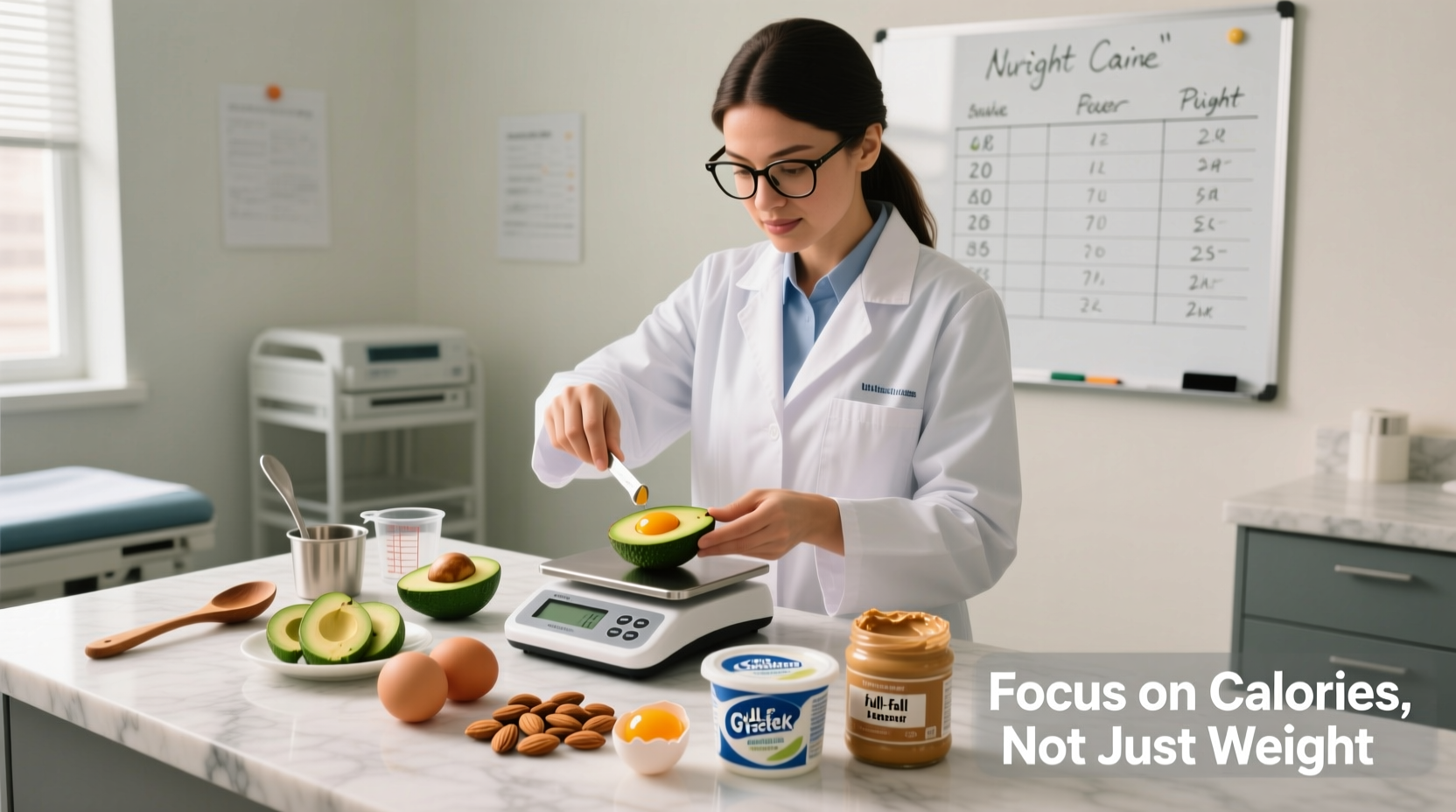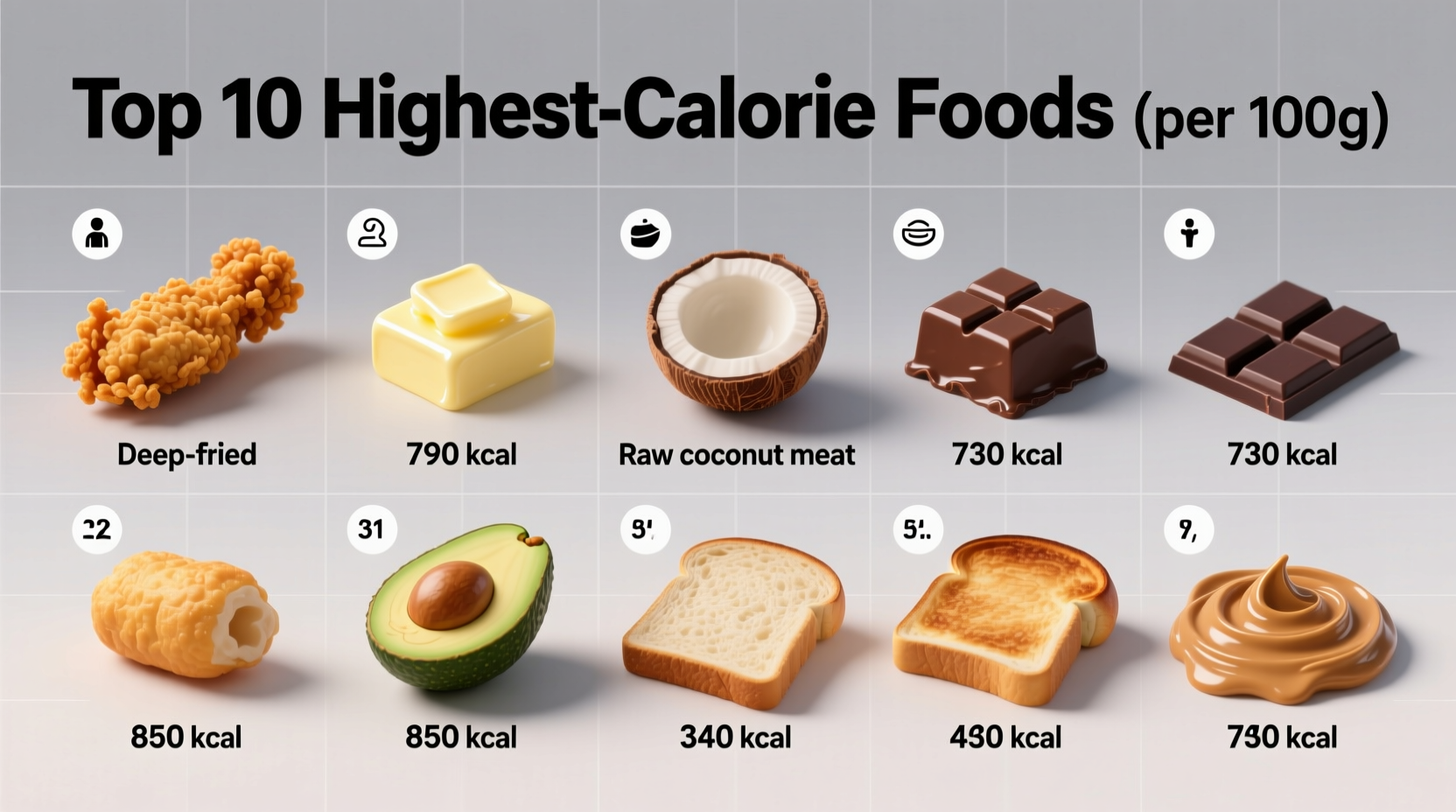Understanding which foods contain the highest calories per serving is essential for athletes, individuals seeking healthy weight gain, or those managing specific nutritional requirements. Calorie density directly impacts how efficiently you can meet daily energy needs, whether you're fueling intense training sessions or recovering from medical conditions requiring increased caloric intake.
The Science Behind Calorie Density
Calorie density refers to the number of calories per unit of food weight. Foods high in fats naturally contain more calories because fat provides 9 calories per gram—more than double the 4 calories per gram from both protein and carbohydrates. This fundamental nutritional fact explains why pure fats, nuts, seeds, and certain dairy products dominate the high-calorie food list.
When evaluating foods with the most calories, it's crucial to distinguish between nutrient-dense high-calorie foods and empty-calorie options. Nutrient-dense choices provide essential vitamins, minerals, and healthy fats alongside their caloric content, making them superior options for sustainable energy needs.
Top Calorie-Dense Foods by Category
Based on USDA FoodData Central measurements, these foods deliver the highest calories per 100-gram serving while maintaining significant nutritional value. The table below shows verified calorie counts from authoritative nutritional databases:
| Food | Calories per 100g | Primary Calorie Source | Key Nutrients |
|---|---|---|---|
| Vegetable oil (all types) | 884 | Fat | Vitamin E, essential fatty acids |
| Dark chocolate (70-85% cocoa) | 598 | Fat, carbs | Iron, magnesium, antioxidants |
| Almonds | 579 | Fat, protein | Vitamin E, magnesium, fiber |
| Peanut butter | 588 | Fat, protein | Niacin, magnesium, healthy fats |
| Dried coconut | 660 | Fat | Manganese, copper, selenium |
| Sunflower seeds | 584 | Fat, protein | Vitamin E, selenium, magnesium |
| Dates | 277 | Carbs | Potassium, magnesium, fiber |
| Cheddar cheese | 402 | Fat, protein | Calcium, vitamin K2, protein |
Data sourced from USDA FoodData Central, the authoritative nutritional database maintained by the United States Department of Agriculture.
Practical Applications of High-Calorie Foods
Knowing which foods have the most calories serves specific practical purposes beyond simple curiosity. For athletes in endurance sports, calorie-dense foods provide efficient energy sources during training and competition. Medical professionals often recommend these foods for patients recovering from illness or surgery who need to regain weight quickly.

Registered dietitians at the Mayo Clinic emphasize that "strategic incorporation of calorie-dense whole foods remains the preferred approach for healthy weight gain compared to processed high-calorie options" (Mayo Clinic, 2023). This evidence-based recommendation highlights the importance of selecting nutrient-rich high-calorie foods rather than empty-calorie alternatives.
Contextual Considerations for High-Calorie Foods
While certain foods contain the most calories, their appropriateness varies significantly based on individual circumstances. The context boundaries for high-calorie food consumption include:
- Weight management goals: Those seeking weight loss should consume high-calorie foods in strict moderation
- Activity levels: Highly active individuals can utilize these foods more effectively than sedentary people
- Nutritional requirements: Medical conditions like cancer or HIV may necessitate increased calorie intake
- Dietary restrictions: Allergies or intolerances may eliminate certain high-calorie options
Research published in the American Journal of Clinical Nutrition demonstrates that "nutrient-dense calorie sources produce better metabolic outcomes than equivalent calories from processed foods" (2022). This finding underscores why selecting the right high-calorie foods matters more than simply maximizing calorie count.
Strategic Incorporation Into Your Diet
For those seeking to increase daily caloric intake, consider these practical strategies:
- Add healthy fats like avocado or olive oil to existing meals
- Choose whole food sources over processed high-calorie options
- Combine high-calorie foods with protein for balanced nutrition
- Track intake using reliable nutrition apps to avoid overconsumption
- Consult a registered dietitian for personalized recommendations
Remember that "most calories" doesn't automatically mean "best choice." The nutritional profile, processing level, and your individual health goals should guide your selections from the list of highest calorie foods.
Frequently Asked Questions
Which food has the absolute highest calories per serving?
Pure fats and oils contain the highest calories at 884 calories per 100 grams. Among whole foods, dried coconut (660 calories/100g), dark chocolate (598 calories/100g), and most nuts and seeds (550-650 calories/100g) rank highest. However, these pure fats should be consumed in moderation as part of a balanced diet.
What are the healthiest high-calorie foods for weight gain?
The healthiest calorie-dense foods include nuts, seeds, avocado, olive oil, full-fat dairy, and dried fruits. These provide essential nutrients alongside calories. A study in the Journal of the Academy of Nutrition and Dietetics found that "whole food sources of concentrated calories produced better long-term health outcomes than processed alternatives" when used for weight gain purposes.
How many calories should I consume daily from high-calorie foods?
Daily calorie needs vary by individual factors including age, gender, activity level, and health goals. The Dietary Guidelines for Americans recommend that fats comprise 20-35% of total daily calories. For healthy weight gain, registered dietitians typically suggest adding 300-500 nutrient-dense calories daily above maintenance needs, focusing on whole food sources rather than processed options.
Can high-calorie foods be part of a weight loss diet?
Yes, when consumed strategically. Small portions of calorie-dense foods like nuts, avocado, and olive oil can increase satiety and nutrient density in weight loss diets. Research from Harvard Medical School shows that "diets including moderate amounts of healthy fats resulted in better long-term weight management than strict low-fat approaches" due to improved satisfaction and nutrient absorption.











 浙公网安备
33010002000092号
浙公网安备
33010002000092号 浙B2-20120091-4
浙B2-20120091-4